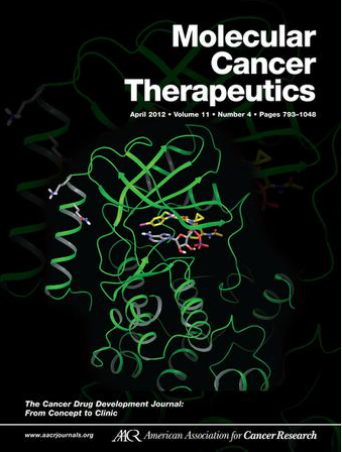摘要 A012:靶向蛋白酶体漏洞治疗与 7 号单体相关的血液疾病
IF 5.3
2区 医学
Q1 ONCOLOGY
引用次数: 0
摘要
单体 7 是血液病中最常见的细胞遗传学异常之一,与存活期短和耐药性有关。尽管单体 7 基因异常发病率高、影响恶劣,但与单体 7 基因异常相关的血液疾病的治疗漏洞在很大程度上仍然难以捉摸,阻碍了改善患者护理的进程。细胞对必需基因正常剂量的平衡性要求,为针对单倍体必需基因编码的蛋白质水平降低而产生的薄弱环节提供了机会。简而言之,剂量敏感的重要基因(X 基因)的一个拷贝缺失,再加上自身或相关基因(Y 基因)或相关途径受到抑制,就会给细胞带来致命的后果。来那度胺在治疗 del(5q) MDS 方面卓越的选择性临床疗效证明了等位基因单倍体缺乏症是如何通过合成致死性对这种药物产生敏感性的。对单体7型原发性急性髓细胞样本中基因和蛋白质表达的差异表达分析表明,蛋白酶体通路的多个成员在蛋白质水平上显著下调,但在RNA水平上没有下调。两个独立的体外药物筛选队列(Beat AML 和 FIMM 研究)证明,-7/del(7q)的原发性急性髓细胞样本对蛋白酶体抑制剂硼替佐米的敏感性增加(IC50 低)。染色体 7 上有四个蛋白酶体亚基:PSMA2、PSMC2、PSMG3 和 SEM1。我们进行了基因表达、蛋白表达、拷贝数分析和单个基因敲除实验。结果表明,PSMA2是7号染色体上的一个单倍体必需基因。在 TP53 野生型和基因敲除背景下,PSMA2 基因敲除会使多个急性髓性白血病细胞系处于生长劣势。我们生成了 PSMA2 同源基因半杂合子缺失和二倍体单细胞克隆。与二倍体对照组相比,PSMA2半杂合子缺失细胞的蛋白表达量约为对照组的一半,这证实了PSMA2是一个单倍体基因。PSMA2半杂合子缺失单细胞克隆对所评估的三种蛋白酶体抑制剂(硼替佐米、伊沙佐米和卡非佐米)的敏感性都明显增强,这与在原发性-7/del(7q)白血病样本中观察到的敏感性一致。PSMA2半杂合子缺失细胞克隆在接受蛋白酶体抑制剂治疗后,p38水平升高,pERK水平降低,这可能是它们对蛋白酶体抑制剂更敏感的原因。蛋白质组学分析和体内验证正在进行中。因此,我们发现了单倍体必需基因PSMA2介导的蛋白酶体通路在7号单体相关白血病中的脆弱性,并进一步表明蛋白酶体抑制剂是治疗7号单体相关血液病的有前景的治疗方法:Haijiao Zhang, Basil Allen, Daniel Bottomly, Peter Ryabinin, Schannon K. Targeting proteasome vulnerabilities for the treatment of monosomy 7 associated blood disorders [abstract].In:AACR 癌症研究特别会议论文集:扩展和转化癌症合成漏洞;2024 年 6 月 10-13 日;加拿大魁北克省蒙特利尔。费城(宾夕法尼亚州):AACR; Mol Cancer Ther 2024;23(6 Suppl):Abstract nr A012.本文章由计算机程序翻译,如有差异,请以英文原文为准。
Abstract A012: Targeting proteasome vulnerabilities for the treatment of monosomy 7 associated blood disorders
Monosomy 7 is among the most frequent cytogenetic abnormalities in hematological disorders and is associated with short survival and drug resistance. Despite its high prevalence and detrimental impact, the therapeutic vulnerabilities underlying monosomy 7-associated blood disorders remain largely elusive, impeding progress toward improved patient care. The homeostatic cellular requirement for a normal dosage of essential genes creates an opportunity to target vulnerabilities that arise due to reduced levels of proteins encoded by a haploinsufficient essential gene. Briefly, the loss of one copy of a dosage-sensitive essential gene (gene X), in combination with the inhibition of itself or a related gene (gene Y), or an associated pathway results in lethal consequences for cells. The remarkable and selective clinical efficacy of lenalidomide for the treatment of del(5q) MDS has demonstrated how allelic haploinsufficiency underlies the sensitivity to this drug by synthetic lethality. Differential expression analysis of gene and protein expression in primary AML samples with monosomy 7 revealed significant downregulation of multiple proteasome pathway members at the protein level, but not at the RNA level. Primary AML samples with -7/del(7q) exhibited increased sensitivity (low IC50) to the proteasome inhibitor bortezomib, as evidenced by two independent ex vivo drug screening cohorts (the Beat AML and the FIMM study). Chromosome 7 harbors four proteasome subunits, PSMA2, PSMC2, PSMG3, and SEM1. We performed gene expression, protein expression, copy number analysis, and individual gene knockout experiments. The results have revealed PSMA2 to be a haploinsufficient essential gene on chromosome 7. PSMA2 knockout confers leukemia a growth disadvantage for multiple AML cell clines in both TP53 wild-type and knockout backgrounds. We generated PSMA2 isogenic hemizygous deletion and diploid single-cell clones. PSMA2 hemizygous deletion cells exhibited approximately half the protein expression compared to diploid controls, confirming that PSMA2 is a haploinsufficient gene. PSMA2hemizygous deletion single-cell clones showed significantly enhanced sensitivity to all three evaluated proteasome inhibitors (bortezomib, ixazomib, and carfilzomib), aligning with the sensitivity observed in primary -7/del(7q) leukemia samples. PSMA2 hemizygous deletion cell clones displayed increased p38 and decreased pERK levels upon treatment with proteasome inhibitors, potentially contributing to their increased sensitivity to proteasome inhibitors. Proteomics analysis and in vivo validation is ongoing. As such, we have identified haploinsufficient essential gene PSMA2 mediated proteasome pathway vulnerability in monosomy 7 associated leukemia and further showed that proteasome inhibitors as promising therapeutic approaches for treating hematological disorders associated with monosomy 7.
Citation Format: Haijiao Zhang, Basil Allen, Daniel Bottomly, Peter Ryabinin, Schannon K. Targeting proteasome vulnerabilities for the treatment of monosomy 7 associated blood disorders [abstract]. In: Proceedings of the AACR Special Conference in Cancer Research: Expanding and Translating Cancer Synthetic Vulnerabilities; 2024 Jun 10-13; Montreal, Quebec, Canada. Philadelphia (PA): AACR; Mol Cancer Ther 2024;23(6 Suppl):Abstract nr A012.
求助全文
通过发布文献求助,成功后即可免费获取论文全文。
去求助
来源期刊
CiteScore
11.20
自引率
1.80%
发文量
331
审稿时长
3 months
期刊介绍:
Molecular Cancer Therapeutics will focus on basic research that has implications for cancer therapeutics in the following areas: Experimental Cancer Therapeutics, Identification of Molecular Targets, Targets for Chemoprevention, New Models, Cancer Chemistry and Drug Discovery, Molecular and Cellular Pharmacology, Molecular Classification of Tumors, and Bioinformatics and Computational Molecular Biology. The journal provides a publication forum for these emerging disciplines that is focused specifically on cancer research. Papers are stringently reviewed and only those that report results of novel, timely, and significant research and meet high standards of scientific merit will be accepted for publication.

 求助内容:
求助内容: 应助结果提醒方式:
应助结果提醒方式:


